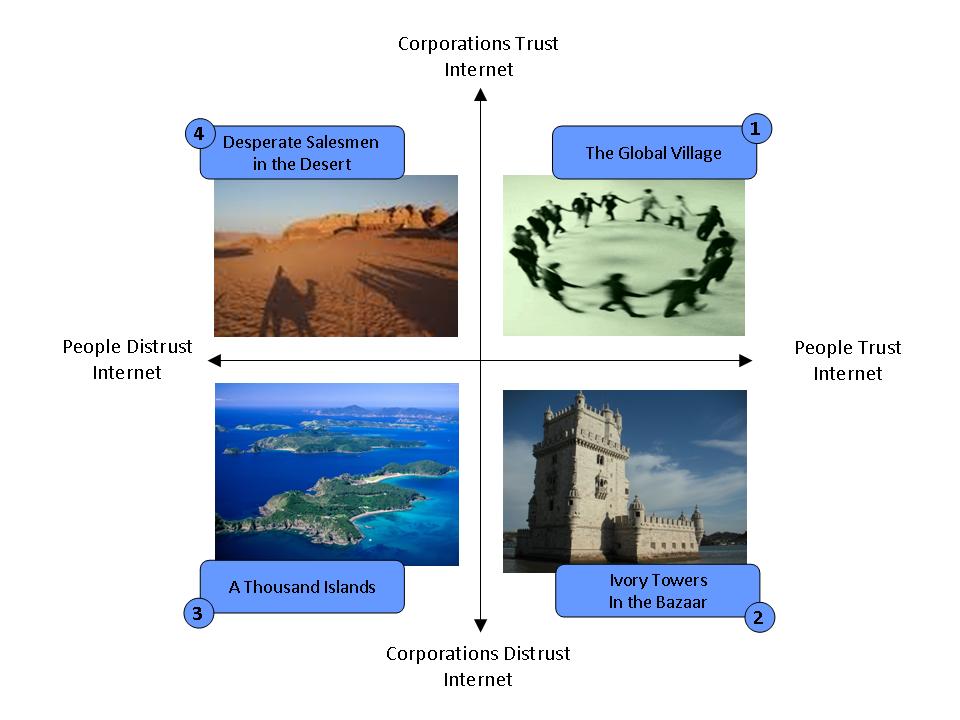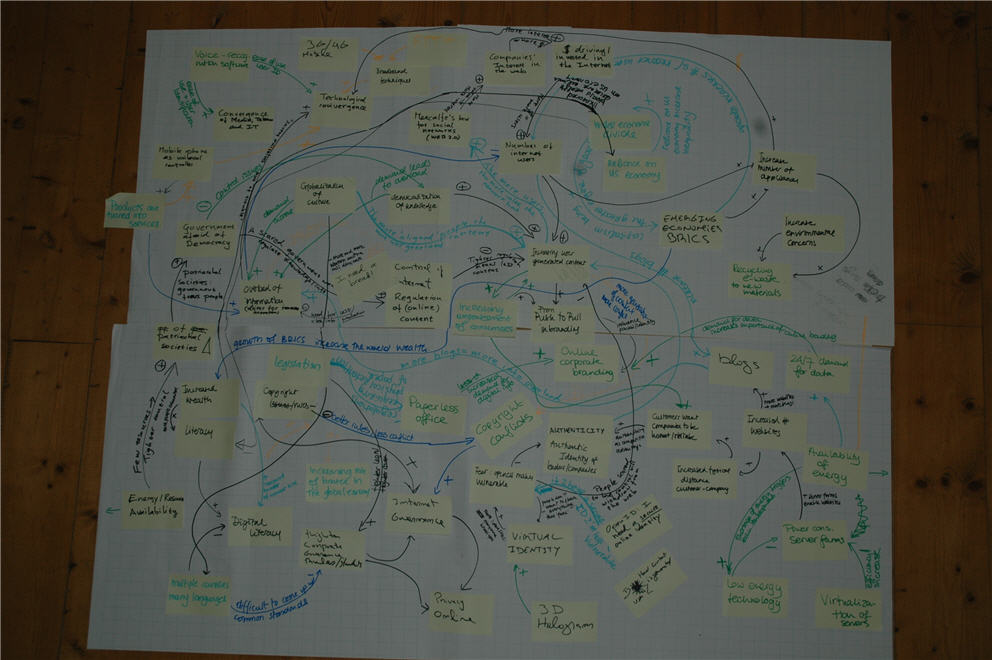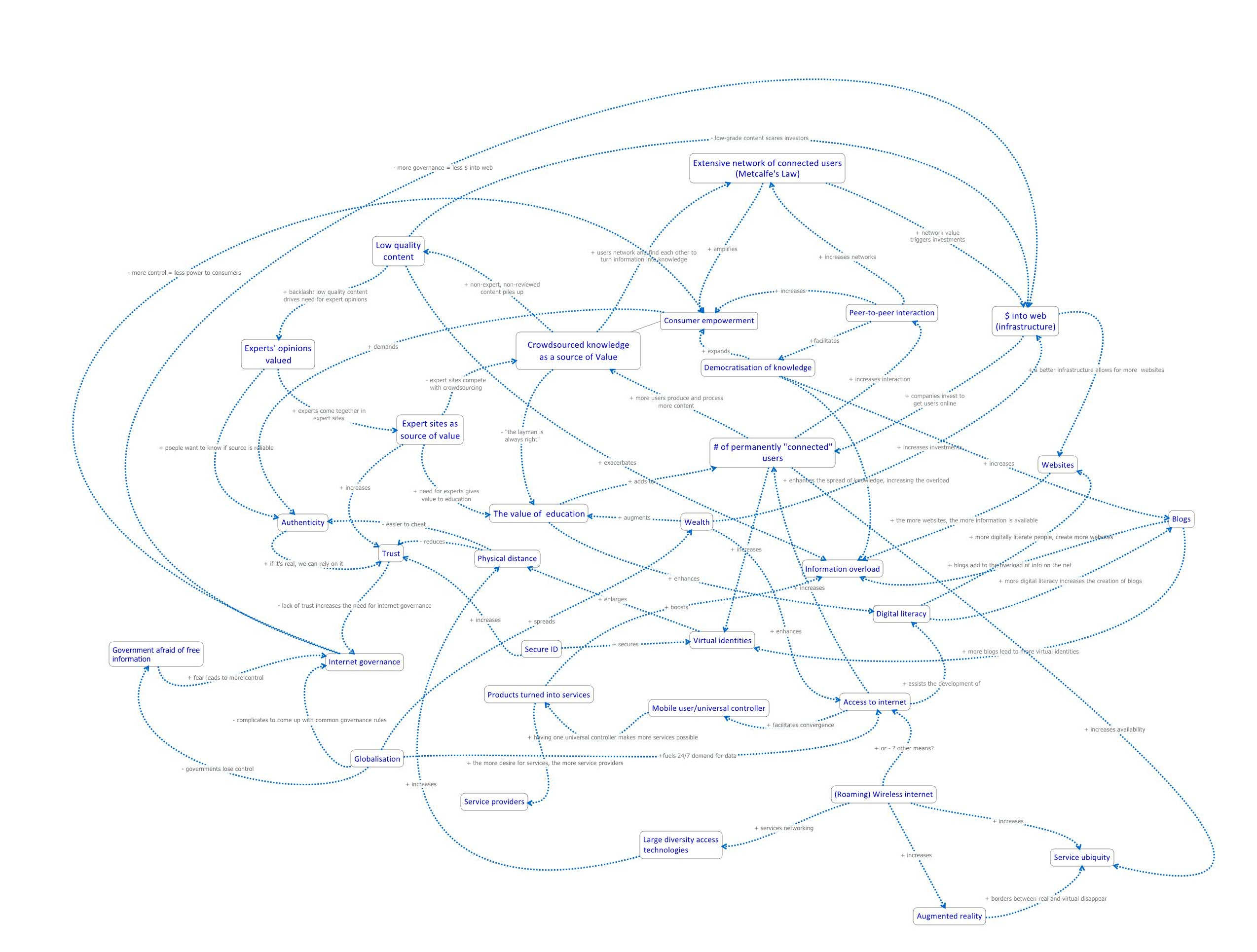The Future of Corporate Websites in Europe 2015
Team
Daniel Peters
Rosalie Kuyvenhoven
Seda Demircioglu
Jetske Tamboezer
José Nunes
The four scenarios
1. The Global Village: Both people and companies want transparency and openness. Both parties trust the Internet and interconnected websites form one big 'Global Village' where people and companies interact intensively with one another.
2. Ivory Towers in the Bazaar: Although people want transparency and trust the Internet, companies have raised their shields after they were "exposed" on the web. Virtual "merchants" appear and act as intermediaries between people and companies, filling the gap caused by people wanting more than companies can offer.
3. 1000 Islands: Both people and companies grow to distrust the Internet as peoplle feel vulnarable when placing their personal information online and companies face the consequences of governments regulation and restricting online activities. For people and companies, it is each for their own and disconnected "islands" appear on the web.
4. Desperate Salesmen in the Desert: People grow to distrust the web as they feel exposed online due to governments using the web in policing and detective workand the lack of secure online IDs. Companies have free access to vast amounts of user-information they obtain through the web and use to target people. However, people's distrust of the web makes them reluctant to bite.
Driving forces
Edited existing driving forces
- Control of the Internet
- Tighter corporate governance standards
- Convergence of Telecommunication, Media & entertainment and Information technology
- Products are Turned Into Services
- The increasing role of barter in the global economy
- The Globalization of Culture (or Cultural Globalization)
- Increasing user-generated content
- Voice-recognition system
- THE RECYCLING OF MATERIALS AND REPRODUCING TO NEW MATERIALS
Newly added driving forces
- Increasing empowerment of consumers
- Wider economic divide
- Metcalfe's law applied to social networks
- Increasing use of mobile phones as universal interface/controller
- Internet Governance
- Privacy Online
- Importance of authentic identity
- Increasing democratization of knowledge
- The increased importance of online corporate branding
- Power consumption of server farms
Research questions
1. Will telco's, media company's and IT companies continue to converge or be halted by legislation and social contra pressures?
Related DF: Convergence of Telecommunication, Media & entertainment and Information technology
2. Will appliances continue to converge technologically and if so, to what extent?
Related DF: Convergence of Telecommunication, Media & entertainment and Information technology
3. Will the mobile phone become a universal controller for household appliances?
Related DF: Increasing use of mobile phones as universal interface/controller
4. What is the current state of ubiquitous computing?
Related DF: Increasing Human-Computer Interaction
5. Does Metcalfe's law hold for social networking websites?
Related DF: Metcalfe's law applied to social networks
6. Will the growth of crowdsourced media lead to a re-establishment of the value of expert opinions?
Research topic:The balance between crowdsourced and "expert" opinion
7. What will be the impact of authenticity on corporate identity and communication?
Related DF: Importance of authentic identity
8. What is 'democratization of knowledge'?
Related DF: Increasing democratization of knowledge
9. What are the main challenges for cultures in a globalized world?
Related DF: The Globalization of Culture (or Cultural Globalization)
10. How does the development of user generated content change our view on the world?
Related DF: Increasing user-generated content
11. What will be the role of the regulator in the control of the internet?
Related DF: Internet Governance
Research topic:The balance between self-regulation and global control/regulation of the web
12. Should control over corporate governance increase or be eased? What will be the impact in the web corporate development?
Related ]DF: Tighter corporate governance standards
13. Do threats like cybercrime and terrorism justify measures to control privacy data protection? What might be the repercussions for web corporate development?
Related DF: Privacy Online
14. How to share the internet resources in an efficient and innovative manner?
Related DF: Internet Governance and Control of the Internet
15. How important will corporate online branding be in 2020?
Related DF: The increased importance of online corporate branding
16. Will increased recycling of e-waste lead to reduced demand for raw materials?
Related DF: THE RECYCLING OF MATERIALS AND REPRODUCING TO NEW MATERIALS
17. Will voice-recognition play an important role in Internet in 2020?
Related DF: Voice-recognition system
18. What will be the power demand of server farms in 2020?
Related DF: Power consumption of server farms
19. Will the world continue to be reliant on US economy?
Related DF: The Globalization of Culture (or Cultural Globalization)
Wider economic divide
20. Will US continue to dominate the global culture?
Related DF: The Globalization of Culture (or Cultural Globalization)
21. Will the world economy continue grow at the expense of equality in the allocation of income?
Related DF:Wider economic divide
22. How will the corporates lock-in consumers (ensure customer loyalty) against sheer volume of choices and information?
Related DF:Increasing empowerment of consumers
23. Will the value and use of money (currencies) change/diminish?
Related DF:The increasing role of barter in the global economy
24. Does the economy have impact on barter exchange?
Related DF:The increasing role of barter in the global economy
25. How will the barter exchanges ensure trust in the business context?
Related DF: The increasing role of barter in the global economy
Systems Diagram
Systems Diagram: 1st version
Systems diagram: final version


